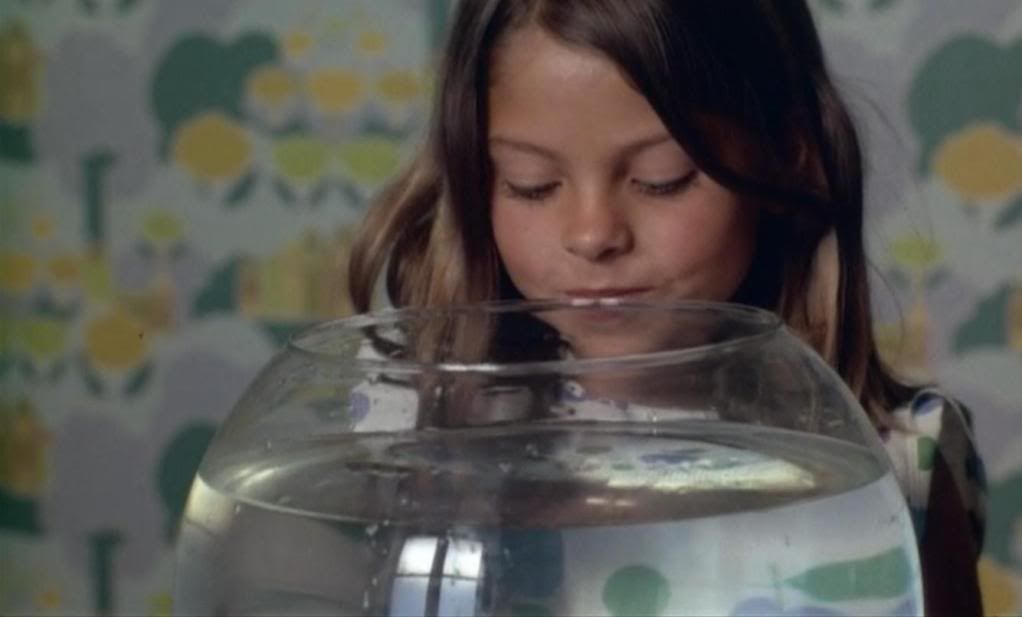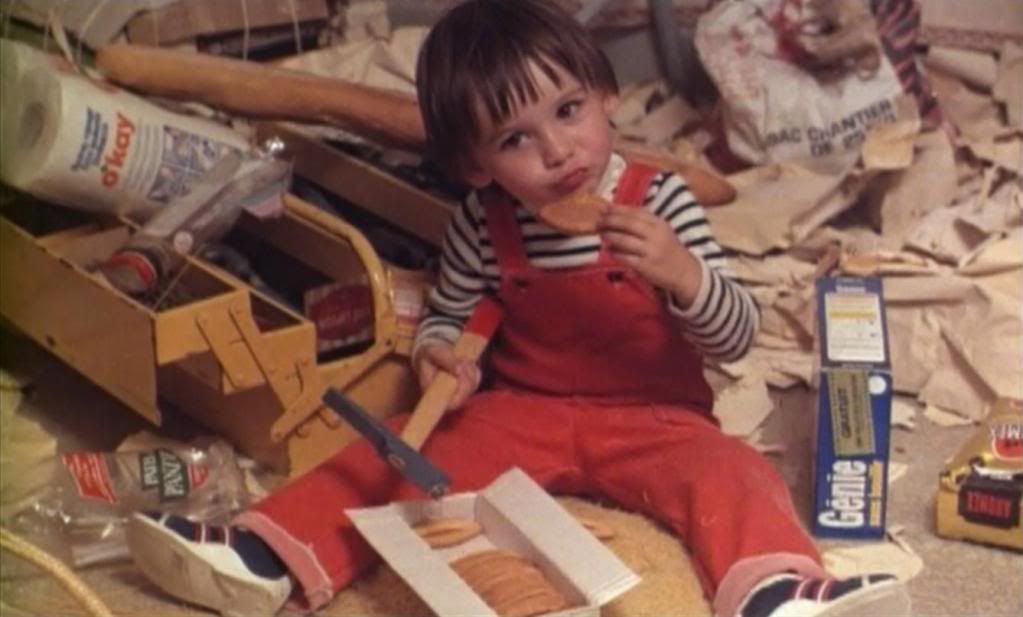
With Small Change, François Truffaut returns again to the topic of childhood, one of the recurring thematic focuses of his films ever since his famous debut feature The 400 Blows. It's a loose, anecdotal film, charming and sweet if perhaps also a little lightweight. There's little structure here, simply a series of vignettes involving various children living in a small town, as well as their teachers, particularly Richet (Jean-François Stévenin), whose wife is expecting a child of their own.
The film meanders along at an easy pace, bouncing lightly from one gently comic anecdote to another. One continuing subtext throughout the film is Truffaut's focus on the dawning of sexuality, the first stirrings of feelings about the opposite sex. The boys are always spying on girls, catching glimpses of one woman's skirt riding up as she bends over or another girl bathing herself, naked, in her window. These flashes of nudity and sensuality have the illicit erotic charge of something not fully understood but powerfully felt regardless. Similarly, Truffaut captures the infatuation of one boy, Patrick (Georges Desmouceaux), with his friend's mother (Tania Torrens), gazing rapturously at her and associating her with a poster he sees of a man and a woman on vacation in a train car, locked in a pose that, for the young boy, seems replete with sexual promise: Truffaut cuts rapidly back and forth between closeups of the man and the woman in the poster, as though visualizing the way that the boy tries to make sense of the obvious attraction between the poster's couple.
Truffaut also drops a few subtle movie references into the film, in particular to Hitchcock's Rear Window. Patrick's father is confined to a wheelchair, paralyzed, and at one point he looks out his window and sees a man in the opposite flat stringing film through reels for a projector. But the Rear Window references are most potently realized in a clever sequence where Sylvie (Sylvie Grezel) is left at home by her parents because she's being stubborn, so she appeals to her neighbors in the adjoining buildings by using a bullhorn to announce that she's hungry. Truffaut's camera pans around the courtyard, where all the residents gather at the windows, and finally conspire to use a basket and a pulley system — like the basket used to raise and lower a dog in Hitchcock's film — to deliver some food to Sylvie for her lunch.

One curious scene is the one where the toddler Grégory plays with his cat by a window and hangs off the ledge when the cat falls to a lower balcony. Truffaut builds the obvious tension of this scene, in which the boy's mother has gone out and he's been left home alone, getting into a dangerous situation, edging into ever more precarious positions as he clambers clumsily along the balcony, hanging off the small rail that's the only protection between him and a fall of several stories. Down below, people start noticing and can only watch helplessly as the boy hangs off the rail and finally falls to the ground. At this point, Truffaut abruptly breaks the suspense by having the kid land on his butt and simply giggle, unfazed and unharmed by the fall, which in reality would certainly have injured him severely at the least. It's a totally puzzling scene, followed up by a conversation between Richet and his wife in which they conclude that kids are tougher than one thinks, which must be the trite moral that Truffaut wants to communicate here. But it comes off as a bizarre piece of fantasy, a surreal fracture in a film that is otherwise committed to low-key realism, really offputting in its casual dismissal of the danger of this scenario.
It's especially jarring because, while the film generally has a pretty light and rosy outlook on childhood, Truffaut doesn't flinch away from the story of Julien (Philippe Goldmann), a poor kid whose family is abusing and beating the boy, a discovery that only comes out during a school physical. This plotline is treated with real honesty and directness, and it provides the opportunity for a speech from Richet that sums up the movie's treatment of childhood: "life is hard, but it's wonderful."
For the most part, Truffaut leans more towards the "wonderful" here, and the film is charming and pleasant from beginning to end, with nicely naturalistic performances from all the amateur child actors. It's a low-key film, with only sporadic traces of the more emotionally intense approach to childhood that Truffaut had explored in The 400 Blows. For the most part, he gracefully and tastefully covers sexual awakening, friendship and teasing, petty stealing and pranks, with a light touch and a warm, affectionate sensibility. A sweet, unassuming film, Small Change is a slight trifle that's nevertheless often moving and quietly funny.

2 comments:
I trust you're familair with Truffaut's short Les Mistons
This film released at a time I was involved with the college newspaper and film reviews and I vividly recall a glowing in-print reaction, which does carry over to the present day, even if the film is admittedly as you note a"lightweight." Agreed on the points of reference to THE 400 BLOWS and REAR WINDOW. Yes, Julien's story is the darkest and most resonant, and there is sexual awakening sprinkled throughout. The girlwho begas for food after her parents leave her home is a hoot, and there is certainly some serious fright in Gregory's fall. As always real nice work here!
Post a Comment